—contributed by Lizette Royer Barton
Today is my birthday and I am celebrating with a blog about Mary Brown Parlee (1943-2018).
I was born November 19, 1980 and by that time Parlee was already absolutely crushing it. And by “it” I mean feminist scholarship and groundbreaking research in the psychology of women. If I’m being honest, and I’m 41 today so why not, Parlee’s research is so good and so scholarly, that I have been simultaneously blown away by her work and embarrassed by my lack of scientific understanding. But hey, at 41 I know better than to pretend to understand everything. So, this blog may not do Mary Brown Parlee justice in regard to her absolutely brilliant scholarship, but I hope it inspires someone out there to get to Akron and start a historical research project using this collection because these papers and their creator are incredible. For real.
If you’d like some biographical context before we get rolling head over to Psychology’s Feminist Voices and check out their profile on Mary Brown Parlee. It’s excellent, of course.
There is so much rich material in this collection it was hard to determine what story to tell in this blog post. However, I found myself coming back again and again to a paper Parlee presented in 1997 titled, PMS: A Historical Perspective. Parlee delivered this talk as part of a panel discussion on “Interdisciplinary Thinking on Premenstrual Syndrome” at the 12th conference of The Society for Menstrual Cycle Research.
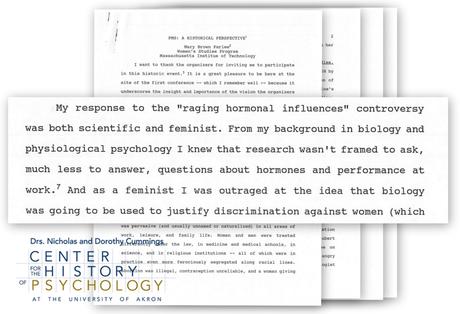 Mary Brown Parlee papers, box M7542, folder “PMS: A Historical Perspective”
Mary Brown Parlee papers, box M7542, folder “PMS: A Historical Perspective”My response to the ‘raging hormonal influences’ controversy was both scientific and feminist. From my background in biology and physiological psychology I knew that research wasn’t framed to ask, much less to answer, questions about hormones and performance at work. And as a feminist I was outraged at the idea that biology was going to be used to justify discrimination against women …
The paper is great (the endnotes are amazing!) but what makes it even more fun is that since it’s retrospective, original documents exist throughout the collection that illustrate the story she was telling.
Mary Parlee has the receipts!
In PMS: A Historical Perspective, Parlee writes candidly about receiving rejection letter after rejection letter from top journals regarding the publication of her work on menstruation. She writes, “Each [journal] suggested one of the others until the circle was literally complete….Editorial gatekeeping was one way psychology as a discipline kept women’s menstrual experiences at the margins of the field.”
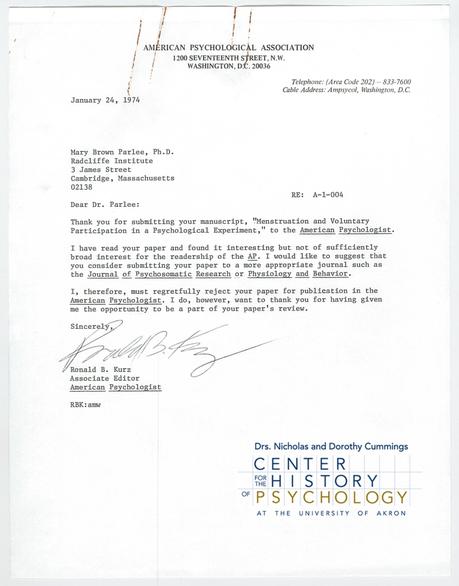 One of many early rejection letters in the Mary Brown Parlee papers [box M7557]
One of many early rejection letters in the Mary Brown Parlee papers [box M7557]Nothing would stop this woman though and she wrote, “…my research interests …shifted when I went to New York in 1975 and became immersed in an absolutely wonderful interdisciplinary group of feminist scholars and activists.” Women supporting women. YES! Maybe some of those wonderful women were in the audience at this address Parlee delivered before the New York Academy of Sciences November 15, 1975. I bet our mutual friend Florence Denmark was in the crowd!
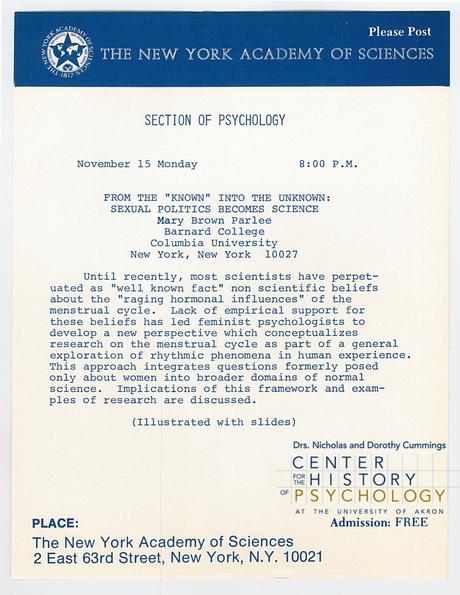 Mary Brown Parlee papers, box M7542, folder “Talks, Presentations 1975-1976”
Mary Brown Parlee papers, box M7542, folder “Talks, Presentations 1975-1976”Parlee described her attendance at the first Conference on Menstrual Cycle Research in 1977 as, “…the first conference I had ever been to where there were so many women, smart women, talking seriously about research on a single topic….[and] the organizational power to define women-centered menstrual cycle research became real.”
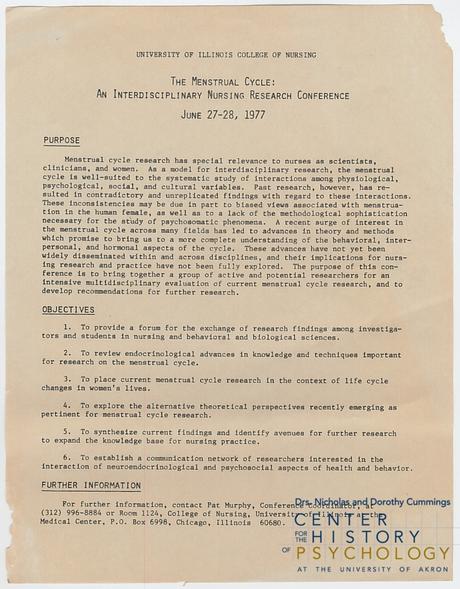 Original flier advertising that first conference on the menstrual cycle in 1977.
Original flier advertising that first conference on the menstrual cycle in 1977. Mary Brown Parlee papers, box M7545, folder “Feminist and Women’s Studies”
Parlee was invited to talk about her PMS research at a “no strings attached” press breakfast hosted by Glenbrook Pharmaceuticals in 1984 just as they were launching their product, Midol. In PMS: A Historical Perspective she writes, “In retrospect I think this is how drug companies influence a scientific field, not by crassly interfering with an individual scientist’s research or writing but by selectively amplifying one particular perspective in ways that both develop markets for its products and influence the direction of scientific research.”
Preach, Mary!!
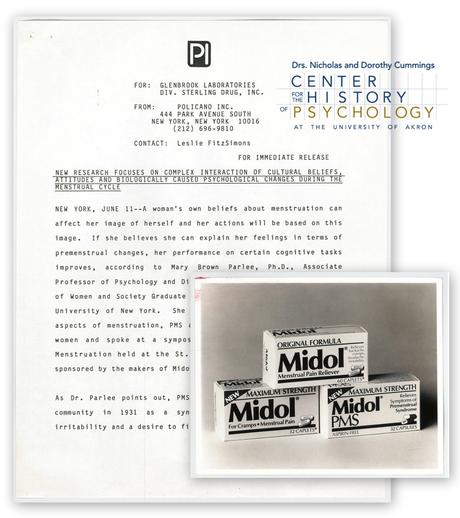 Mary Brown Parlee papers, box M7542, folder “A World View: A Cultural History of Menstruation, 1984”
Mary Brown Parlee papers, box M7542, folder “A World View: A Cultural History of Menstruation, 1984”In the 1980s the American Psychiatric Association was revising the Diagnostic and Statistical Manual (DSM) and “Late Luteal Phase Dysphoric Disorder” (LLPDD aka PMS/PMDD) was added to the appendix of the DSM-IIIR (1987) with the heading, “proposed diagnostic categories needing further study.” As Parlee remembers in PMS: A Historical Perspective, “PMS had become an “it”, something women “have.” It had become an explanation of experiences rather than a name for them.”
Before the 1980s even ended, the American Psychiatric Association was revising the DSM again and Parlee accepted a position on the Scientific Advisory Committee to the Work Group on the LLPDD diagnosis. As she discusses at length in PMS: A Historical Perspective, the group did a super-mega-ultra literature review and was tasked with providing a recommendation on the basis of empirical evidence whether to keep LLPDD in the appendix, move it to the main DSM-IV, or remove it entirely. The Group presented their findings at the 1992 American Psychiatric Association Convention and in remembering this work Parlee wrote, “Despite the negative findings from the literature review, however it was clear in formal discussions of the Work Group’s report and in behind-the-scenes politiking that placement of the diagnosis in the DSM-IV was still controversial.”
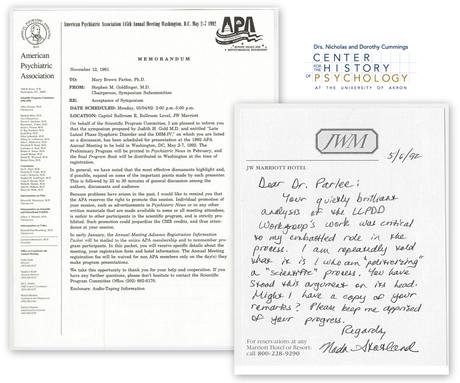 Official memo from the American Psychiatric Association regarding the 1992 Work Group presentation and a letter from Nada Stotland to Parlee (1992). Mary Brown Parlee papers, box M7548
Official memo from the American Psychiatric Association regarding the 1992 Work Group presentation and a letter from Nada Stotland to Parlee (1992). Mary Brown Parlee papers, box M7548But in 1994, there it was, right in the main body of the DSM-IV under “mood disorders” – Premenstrual Dysphoric Disorder (PMDD) and Mary Parlee had this to say, “It was the most political, unscientific, irrational process I have ever experienced….Whatever the scientific facts about PMS and PMS treatments may turn out to be, it is clear that “scientific evidence” was not the basis for including PDD in the DSM-IV.”
Oh snap!
Isn’t this whole thing fascinating? Don’t you want to know more about who was in the working group, what literature they reviewed, and what they presented to the American Psychiatric Association at the end of the process? The Mary Brown Parlee papers contain a full box and a half worth of materials to answer those very questions (and spur even more!).
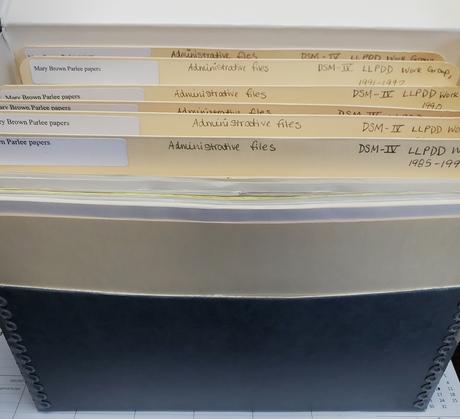 Mary Brown Parlee papers, box M7548
Mary Brown Parlee papers, box M7548In closing PMS: A Historical Perspective, Parlee writes, “Our bodies, ourselves? I don’t know. The “our” implies a unified “we,” and that unified subject makes little sense either in feminism or in the history of menstrual cycle research I’ve discussed. I hope its “future history” will…figure out how menstrual research can be used more powerfully in the places where science and society meet, so that science, media, and public discourse reflect not one hegemonic view but the multiplicity of women’s experiences.”
When Mary Brown Parlee presented this paper in June of 1997 at the 12th conference of The Society for Menstrual Cycle Research, I was 16 years old and heading into the summer before my junior year of high school. Going through her papers and reading (and re-reading) PMS: A Historical Perspective in 2021 as a 41-year-old I am struck by the line, “…so that science, media, and public discourse reflect not one hegemonic view but the multiplicity of women’s experiences.”
Whew. The more things change the more they really do stay the same. Happy Birthday to me?
